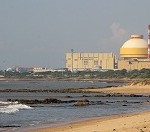On 11 December 2014, President Putin and Prime Minister Narendra Modi signed three key energy agreements – Strengthening Cooperation in Peaceful Uses of Atomic Energy, Provisions for Technical Data and Information Nondisclosure, and Programme of Cooperation under Framework of Inter-governmental Agreement for Enhancement of Cooperation in Oil and Gas in 2015-16. Amit Bhandari, energy and environment fellow at Gateway House, comments on the agreements signed, particularly in the field of nuclear energy cooperation.
Statement:
“The nuclear cooperation agreements signed at the India-Russia summit in December 2014 have established Russia as a major partner in nuclear technology. Russia is the technology partner for Kudankulam Unit-1 (1,000 mw) and the almost-complete Unit-2; it will also assist in setting up Units 3 and 4 at the same site.
India will build atleast 10 more nuclear power reactors with Russian assistance over the next 20 years. Nuclear reactors are low on operating costs but heavy on capital expenditure, and projects are prone to delays. Construction of the Kudankulam Unit-1 took nearly 14 years, double the expected time. Building additional reactors at the same site can expedite completion as many delaying factors such as protests, law-suits and land-acquisition problems would have been tackled already. It is notable that Kudankulam is one of the four power plants being built with foreign assistance – the others are with Areva, GE-Hitachi and Westinghouse.
Russia also sells nuclear fuel to India – a large quantity of India’s uranium imports are from Kazatomprom (Kazakhstan) and TVEL (Russia). As domestic supplies of nuclear fuel are insufficient, imports have allowed India’s nuclear power plants to improve plant load factor from approximately 50% to 80% at present. India can now build more nuclear power plants because it is no longer constrained by lack of fuel as it was in the past. The cost of electricity supplied by the Nuclear Power Corporation of India (NPCIL) is less than the cost of electricity supplied by the National Thermal Power Corporation (NTPC). It is also more environmentally friendly as carbon emissions are low.
Nuclear energy is presently a marginal factor in India’s electricity mix. The reactors being built with foreign help, in addition to India’s own plans, will hopefully constitute a meaningful shift in India’s energy mix.”
For more information or interview requests, please contact Reetika Joshi at joshi.reetika@gatewayhouse.in


